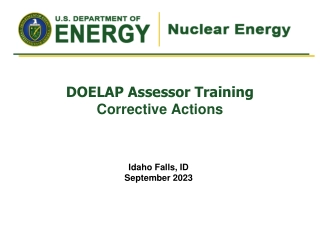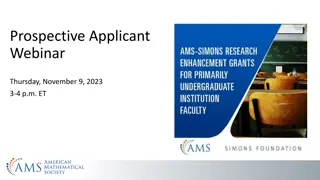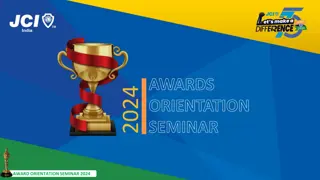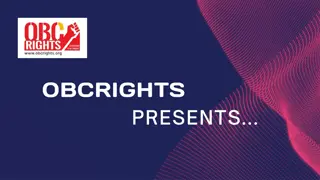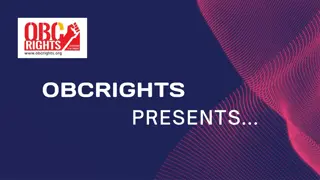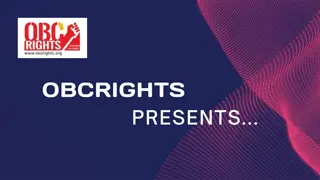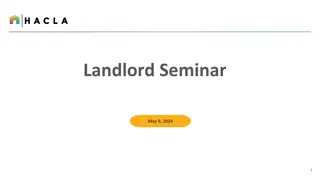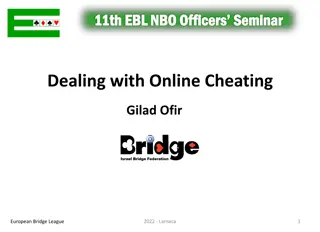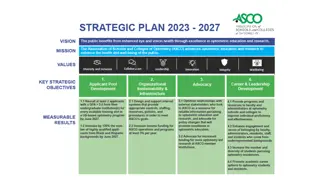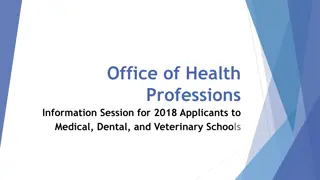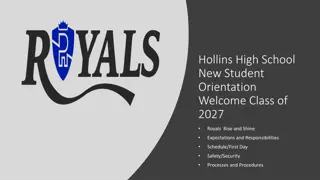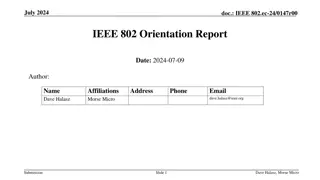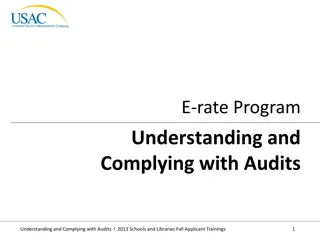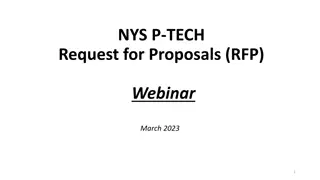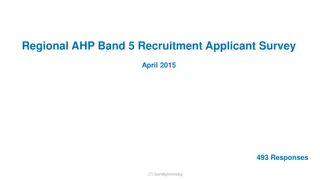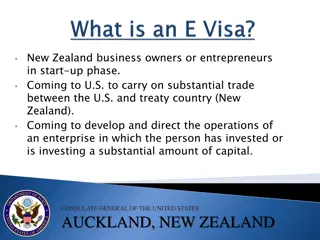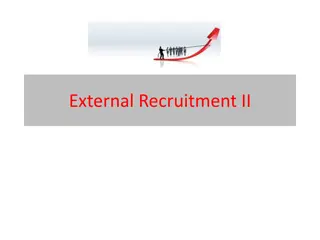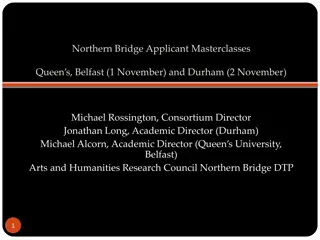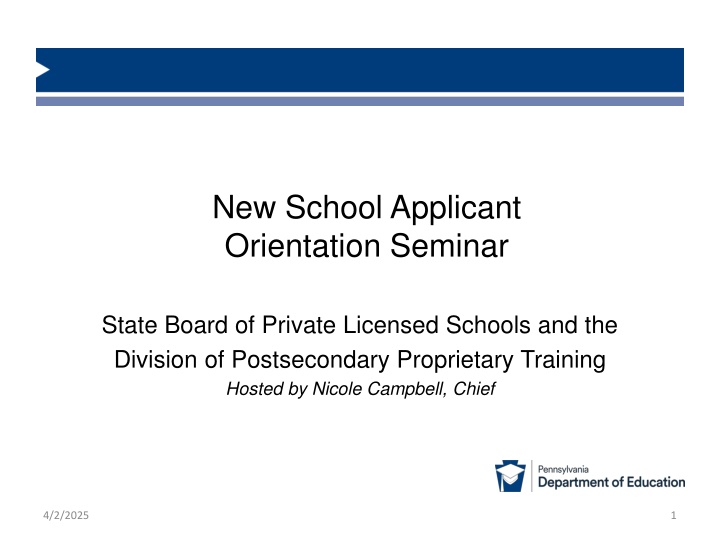
New School Applicant Orientation Seminar: State Board of Private Licensed Schools
Explore the essential details of the New School Applicant Orientation Seminar hosted by Nicole Campbell, Chief, focusing on occupational training in Pennsylvania. Gain insights into requirements, application process, and benefits of seeking authorization to operate as an occupational training provider.
Download Presentation

Please find below an Image/Link to download the presentation.
The content on the website is provided AS IS for your information and personal use only. It may not be sold, licensed, or shared on other websites without obtaining consent from the author. If you encounter any issues during the download, it is possible that the publisher has removed the file from their server.
You are allowed to download the files provided on this website for personal or commercial use, subject to the condition that they are used lawfully. All files are the property of their respective owners.
The content on the website is provided AS IS for your information and personal use only. It may not be sold, licensed, or shared on other websites without obtaining consent from the author.
E N D
Presentation Transcript
New School Applicant Orientation Seminar State Board of Private Licensed Schools and the Division of Postsecondary Proprietary Training Hosted by Nicole Campbell, Chief 4/2/2025 1
Welcome! Seeking to offer occupational training Intended to lead to employment Within PA or to PA residents In exchange for tuition and fees 2
Housekeeping This seminar is a mandated requirement prior to applying for authorization to operate under the State Board of Private Licensed Schools The certificate of attendance is valid for one year We will take one 10-minute break, as appropriate Please do return promptly from break 4/12/2025 3
Housekeeping You will be asked questions periodically for which you may enter your response into the chat Individuals who do not participate in the chat will not receive attendance certificates There will be no learning assessment conducted at the end of this training 4/12/2025 4
Housekeeping It is expected that those in attendance are the individuals who will take accountability for having the applications satisfactorily completed and submitted Please keep your microphones muted unless you are invited to speak to prevent unintended interruptions If you have questions during the presentation, you may wish to hold them until an opportunity is offered to ask questions, or you may enter them at anytime into the chat 4/12/2025 5
Agenda Common questions about who is required to seek authorization to operate as an occupational training provider Why authorization is required Benefits of authorization Statutes, regulations, and policy Compliance and communication Application and fee submission Roles of the Board, Department staff, and the school 7
Agenda Application process What do I need to know after authorization? Highlights of New School Application requirements Highlights of New Program Application requirements Application submission Common causes for delays in authorization 8
What If? We do not have a physical presence in PA? Physical presence. The operation of an entity that offers courses, programs, or degrees or maintains a campus, or an administrative, corporate, or other address, including a post office box, telephone number, recruiters, instructors, advertising in local media and publications at a location in this Commonwealth. 10
What If? We do not have a physical presence in PA? Training providers who do not have a physical presence in PA must be authorized by PDE to advertise to and solicit PA residents for enrollment Including advertising and solicitation via state and federal funding opportunities such as WIOA/CareerLink ETPL and Veteran s Education benefits 11
What If? We do not have a physical presence in PA? The process to apply for authorization is the same for both in-state and out-of-state training providers In-state schools are licensed, Out-of-state schools are registered Authorization is obtained via the State Board of Private Licensed Schools Out-of-state schools are held to the same statutory and regulatory mandates as In-state schools 12
What If? We do not have a physical presence in PA? Out-of-state schools may only enroll students in Board-approved programs (authorization does not permit enrollment in all programs offered) Out-of-state schools calculate renewal fees based on the gross revenue received by PA residents enrolled in Board-approved programs 13
What If? We operate physically in PA but offer only online instruction? If you have operations in PA, regardless of who you advertise to or enroll, or whether you operate fully online or not, you must be authorized by PDE to operate in PA and offer occupational training in exchange for tuition and fees online 14
What If? We offer our training free of charge to all students? If the funding that enables you to offer your training at no cost to students is provided by state or federal funds, your training is most likely required to be authorized by PDE No cost training will not be eligible for WIOA/CareerLink ETPL funding Authorization to operate may be required for accreditation purpose 15
What If? We offer our training free of charge to our employees? If an employer offers occupational training free of charge to its employees, the provider does not need to be authorized However, the employer may at no time charge the employee, even if the employee fails to successfully complete the training or fails to meet any employment longevity expectations Non-employees are not permitted to be offered this training 16
What If? We offer our training to business so that we can train their employees? If a training provider contracts with another business, to train the other business s employees, the training provider does not need to be authorized At no time may the training provider charge or collect tuition/fees from a student (employee), the employer must cover all expenses 17
What If? We offer our training at an already authorized school? If a training provider is contracted by an existing school to provide instruction to their students, the training provider does not need to be authorized The authorized school accepts the student for enrollment, collects the tuition/fees, is responsible for the training content, and awards the credits or clock hours, as well as the conferred program award 18
What If? We offer our training at an already authorized school? The training provider would not advertise the programming, take enrollments, accept tuition/fees, or provide an award 19
What If? We offer our training as tutoring or our training is offered one-on-one? Tutoring is training that begins by meeting the student where they are at and ends when the student deems further training is no longer needed Tutoring does not lead to the qualifications necessary to obtain employment, an earned award, or the ability to apply for a credential 20
What If? We offer our training as tutoring or our training is offered one-on-one? One-on-one training is not automatically tutoring One-on-one training does require PDE authorization to operate if the training is intended to lead to employment 21
What If? We offer our training as test-prep? For a program to be offered as test-prep only, the opportunity would: Not include homework, quizzes, graded assessments, or impose attendance requirements Not offer a completion award and would not award credits or clock hours Not offer necessary training required for credential assessment 22
What If? We operate as a non-profit? Authorization to operate as an occupational training provider is required to charge students tuition/fees, regardless of profit-status 23
What If? We currently offer our training in exchange for tuition and fees? You are legally mandated to cease and desist from offering and providing occupation training in exchange for tuition/fees until licensure/registration with the State Board of Private Licensed is obtained Financial penalties may be imposed, as well as a 5- year moratorium on licensure may be imposed, if operations do not cease Demonstrate a commitment to compliance 24
Why is authorization required? Private Licensed Schools 1986 Act 174 Private Licensed Schools 2019 Act 110 Regulations Chapter 73 The Private Licensed Schools Act provides the minimum operating expectations of our Commonwealth s occupational training providers as a means of protection to our residents, and state and federal funding providers, to ensure quality training and available employment opportunities 26
Benefits of Authorization Compliance with state licensing requirements Compliance with higher education reporting requirements and legislative mandates Ability to be identified as potential workforce development partners Ability to create partnerships with other authorized schools to transfer credits/courses/clock hours 28
Benefits of Authorization Demonstrates on-going commitment to quality of operations and programming Ability to apply for: Accreditation (3rd party demonstration of program quality) Federal Financial Aid WIOA/CareerLink Funding Veteran s Education Benefits (after 2 years) State-related grants and funding opportunities A student complaint process outside of the Attorney General s Office 29
Statutes, Regulations, and Policy Private Licensed Schools 1986 Act 174 Private Licensed Schools 2019 Act 110 The Private Licensed Schools Act was enacted in 1986 It mandated that the State Board of Private Licensed Schools be formed and provided the foundation for the authority of the Board and the minimum operating expectations of occupational training providers The Act was further amended in 2019 as Act 110 30
Statutes, Regulations, and Policy Regulations Chapter 73 The regulations that support the Private Licensed Schools Act were implemented by the Board, with input from the public, and enacted by legislation The regulations have not been updated since 1986 An attempt was made in 2019 to have regulatory revisions made Regulatory revisions require Board, public, and legislative support to pass 31
Statutes, Regulations, and Policy Fees f or Services Fees are mandated by legislation and have not been increased since 2016 32
Statutes, Regulations, and Policy Board Policy Memos The Board may vote to adopt a policy that provides recommendations on a specific issue Policy memos serve to identify concerns and issues and aim to inform and guide decisions and actions Policy memos are presented for public comment prior to being presented to the Board for a vote 33
Compliance and Communication Training Provider Owner Operator Director Compliance Program Director Finance 35
Compliance and Communication State Board of Private Licensed Schools PA Department of Education Division of Postsecondary Proprietary Training Board Administrator Supervisor Chief 36
Compliance and Communication US Department of Education Financial Student Aid Accreditor(s) Institutional Programmatic Licensing Boards State Board of Nursing State Board of Cosmetology Gaming Commission State Board of Massage State Board of Phlebotomy State Board of Medicine State Board of Funeral Directors State Board of Accounting 37
Compliance and Communication WIOA/CareerLink Veteran s Education Bureau of Career & Tech Ed PDE Changes related to: Ownership Financial solvency Tuition collection model Facility use or location Legal actions 38
Compliance and Communication Use calendar reminders Maintain a list of submission deadlines and the specific items to be submitted Maintain a list of contact information Maintain record of websites, usernames, passwords, and what the site is used for Share information received between agencies It is not easier to ask for forgiveness Timeliness and due diligence matter 4/12/2025 39
Application + Fee Submission New School Application $7,500 (includes one new program application) $750 site visit fee (for each location in which instruction will occur) $600 admission rep license (for each rep soliciting and enrolling off-campus) New Program Application $1,400 (up to three applications may be considered at any one time) 40
Application + Fee Submission Applications are considered quarterly Board Meeting Dates and Submission Deadlines May and August meetings are conducted in-person in Harrisburg February and November meetings are conducted virtually via Microsoft Teams You must create a user account and receive access to submit your applications please do this in advance of the submission deadline! SharePoint Site Access Instructions 41
Application + Fee Submission Payments are submitted online Online Payment Center Applications and fees must be received prior to the published deadline to be considered for next meeting please do not wait until the deadline to submit! Applications and fees are valid for four (4) Board meeting cycles (expired applications require the repayment of all necessary fees for resubmission) 42
Application + Fee Submission After the submission deadline, providing corresponding fees have been received, Division staff will conduct a quantitative review to determine if the applications are materially complete If revisions or additional information are needed, staff will provide the school with a letter citing the information to be corrected or to be added The school will have 10 business days to provide revised materially complete applications Applications that are incomplete cannot be moved forward for consideration by the Board 43
Application + Fee Submission Once the applications have been deemed complete, they will be presented to the Board for consideration Schools are expected to be present at the meeting, to engage in discussions about their applications with the Board Schools should expect questions related to all areas of the applications including financial solvency, curriculum and instruction, facility use, instructor qualifications, etc. Applications submitted, applications shared with Board 44
Role of Division Staff Administrative statute, regulatory, and policy compliance and enforcement Ensures timely and complete submissions Processes applications and requests Attempts to resolve instances of non-compliance prior to seeking enforcement action Elevates violations to the Board Able to offer guidance and clarification Unable to offer referrals or legal/financial advice Unable to complete tasks on behalf of the school 45
Role of the Board Approve/deny applications and requests Suspend/revoke authorization Approve/deny admission rep licensure Establish qualifications for instructors and administrators Provide school closing requirements Adopt policy and establish standards Propose regulatory revisions Adjudicate enforcement actions 46
Role of the School What are some of the responsibilities of the school? 47
Role of the School Put students first Demonstrate a working knowledge of the legal requirements necessary to operate a school Know your applications and ensure they are complete, and information is presented consistently across all applications and documentation Know your operations and demonstrate satisfactory record-keeping and organization Be transparent and forthcoming regarding the operations of the schools 48
Role of the School Know your programming and be able to discuss expectations, outcomes, and necessary equipment and facilities Know employment needs and demands and align programming accordingly Know your instructor and administrator qualifications Be able to present your school and programming to the Board in a manner that promotes the quality of operations and programming to be offered 49
Application Process School submits New School + New Program Applications + Fees by submission deadline Staff conducts a review to determine if the applications are materially complete within 3 weeks following the submission deadline If revisions are not necessary, staff will advance the applications for Board consideration If revisions are necessary, staff will provide a 10-day cure letter only one per quarter cycle 50

